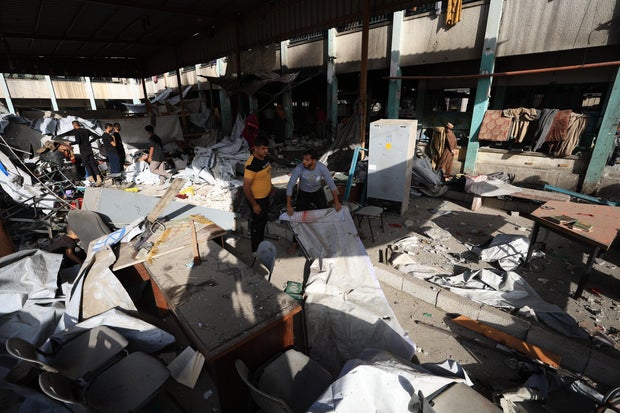Controversial aid group begins work in Gaza

A controversial new U.S. and Israel-backed aid group says it began operating in the war-torn Gaza Strip on Monday, despite objections from the United Nations, other humanitarian groups, and the recent, sudden resignation of its American executive director, who said it couldn't operate independently. The Gaza Humanitarian Foundation (GFH) said it opened its first aid distribution hubs in the enclave on Monday and that truckloads of food had been delivered.
The GFH said in a statement that about 8,000 food boxes had been distributed by Tuesday afternoon, each one containing enough to feed "5.5 people for 3.5 days, totaling 462,000 meals."
"More trucks with aid will be delivered tomorrow, with the flow of aid increasing each day," GHF said in a statement.
There were unconfirmed reports by Israeli and Palestinian media outlets that one of the aid hubs was abandoned by the security personnel in charge of securing the operation after thousands of people clambering for food overran the location. The Israel Hayom newspaper said the security forces withdrew to helicopters amid gunfire.
In a statement, the GFH said there was a "moment in the late afternoon" at one of its Secure Distribution Sites when the number of people seeking aid "was such that the GHF team fell back to allow a small number of Gazans to take aid safely and dissipate. This was done in accordance with GHF protocol to avoid casualties. Normal operations have resumed."
The group said some Palestinians endured "several hour delays in accessing the site due to blockades imposed by Hamas."
In a separate statement, the Israeli military said troops had "fired warning shots in the area outside the compound. Control over the situation was established, food distribution operations are expected to continue as planned, and the safety of IDF troops was not compromised."
The GFH — the leadership and funding of which have remained unclear — was created as Israel and its closest ally, the U.S., faced a growing outcry over Palestinians in Gaza starving amid Israel's nearly three-month blockade of the territory. Under intense pressure from the international community, Israel began letting some food into Gaza last week, but aid organizations have called it a "drop in the bucket" given the level of need.
 A displaced Palestinian receives a food package from a U.S.-backed foundation pledging to distribute humanitarian aid in Gaza, in western Rafah, in the southern Gaza Strip, May 27, 2025.
AFP via Getty
A displaced Palestinian receives a food package from a U.S.-backed foundation pledging to distribute humanitarian aid in Gaza, in western Rafah, in the southern Gaza Strip, May 27, 2025.
AFP via Getty
"As part of the gradual opening of the distribution centers, two of the centers, located in Tel al-Sultan and the Morag Corridor in the Rafah area, began operating today (Tuesday) and are distributing food packages to thousands of families in the Gaza Strip," the Israel Defense Forces said in a statement. "The establishment of the distribution centers took place over the last few months, facilitated by the Israeli political echelon and in coordination with the US government. This process coincided with an ongoing dialogue and cooperation with the IDF."
The IDF said the new aid system was "operated by International Aid Organizations, and Secured by an American Civilian Security Company," but neither the military nor the GHF itself has named any global non-profit organizations involved in the effort, and it was unclear what security firm from the U.S. was helping secure the hubs.
U.N. calls new aid operation a "distraction"
On Tuesday, a spokesperson for the United Nations humanitarian office called the work of GHF a "distraction from what is actually needed," which the spokesperson said was the reopening of crossings into Gaza and the end of Israeli restrictions on the kind of aid entering the territory.
The GFH has been tasked by Israel with taking over the handling of aid in Gaza despite objections from the U.N., which, along with other aid groups, has pushed back against the new system. They assert that Israel is trying to use food as a weapon and say a new system won't be effective.
Israel has pushed for an alternative aid delivery plan because it says it must stop Hamas from seizing aid. The U.N. has denied that Hamas has diverted large amounts of aid. Hamas, long designated a terrorist organization by Israel, the U.S. and the European Union, also denies the allegations.
The GFH began operations just a day after its executive director, American Jake Wood, announced his resignation and said it had become clear the foundation would not be allowed to operate independently. GFH said it had appointed an interim leader, John Acree, to replace Wood.
The organization, said to be made up of former humanitarian, government and military officials, has said its distribution points will provide aid for a million Palestinians - around half of Gaza's population - by the end of the week.
Under pressure from allies, Israel began allowing a trickle of humanitarian aid into Gaza last week after blocking all food, medicine, fuel or other goods from entering since early March. Aid groups had issued multiple warnings of a looming famine in Gaza.
Hamas tells Palestinians not to use new aid system
Hamas warned Palestinians on Monday not to cooperate with the new aid system, saying it is part of Israel's plans to transfer much of Gaza's population to other countries or to force people out of the north into the southern part of Gaza.
Israel says it plans to facilitate what it describes as the voluntary migration of much of Gaza's population of 2 million, a plan rejected by Palestinians and much of the international community.
Israel's military campaign has destroyed vast areas of Gaza and internally displaced some 90% of its population, many people multiple times.
Deadly Israeli strikes in Gaza continue
The desperately needed supplies started flowing into Gaza, according to the GHF, on Monday as Israeli strikes kill at least 52 people in the Palestinian territory.
The airstrikes killed at least 36 people in a school-turned-shelter that was hit as people slept, setting their belongings ablaze, according to the Hamas-run Gaza Ministry of Health. The Israeli military said it targeted militants operating from the school, but CBS News met a young girl who said her mother and all of her sisters were killed in the strike as they slept in the building in the dead of the night.
 Palestinians comb the area following an Israeli airstrike at dawn on a school in the al-Daraj neighborhood of Gaza City that killed at least 31 people on May 26, 2025.
Dawoud Abo Alkas/Anadolu/Getty
Palestinians comb the area following an Israeli airstrike at dawn on a school in the al-Daraj neighborhood of Gaza City that killed at least 31 people on May 26, 2025.
Dawoud Abo Alkas/Anadolu/Getty
Israel renewed its offensive in March after ending a ceasefire with Hamas. It has vowed to seize control of Gaza and keep fighting until Hamas is destroyed or disarmed, and until it returns the remaining 58 hostages, a third of them believed to be alive, from the Oct. 7, 2023, terrorist attack that ignited the war.
Hamas and allied militants killed some 1,200 people, mostly civilians, and abducted 251 people in the 2023 attack. Israel's retaliatory offensive has killed around 54,000 Palestinians, according to the Hamas-run Gaza Ministry of Health. It says more than half the dead are women and children, but it does not distinguish between civilians and combatants in its count.
- In:
- War
- Hamas
- Israel
- Gaza
- Palestinians











 English (US) ·
English (US) ·